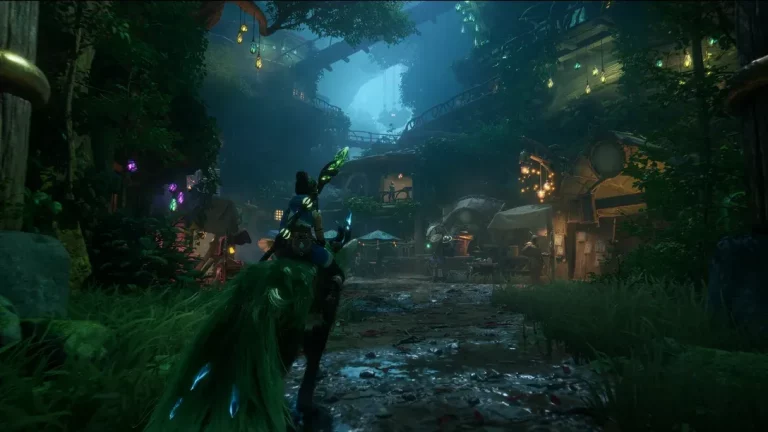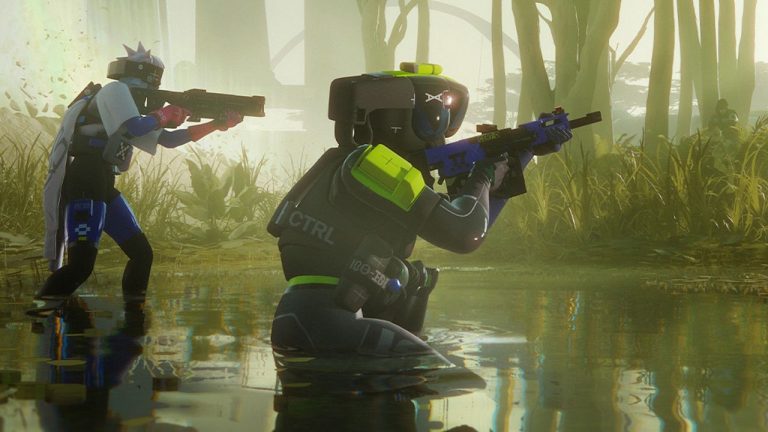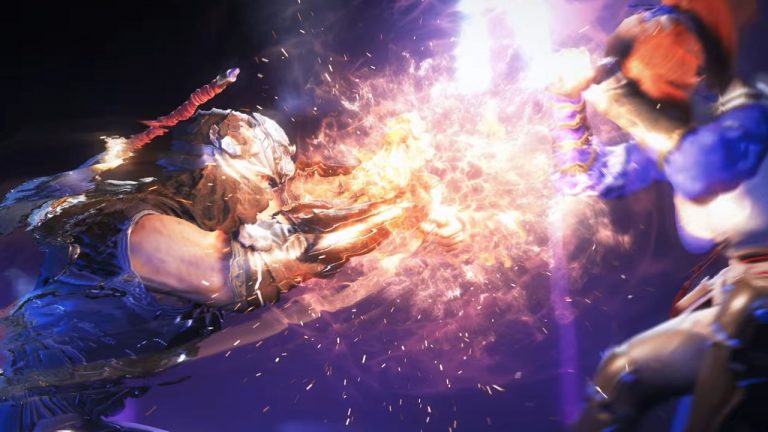PC gaming has always had its own vocabulary, a chaotic swirl of slang, technical terms, and jargon, and these days it can be more confusing than ever. Who could possibly keep up with it all? Well, I could, and I’m here to help you stay abreast of it all too. This little dictionary includes terms every PC gamer should understand, if only so you know when you’re being insulted in a League of Legends match.
Gaming slang
A player’s avatar in the MMO Final Fantasy XIV, engaged in the act of photobombing one of our review screenshots. (Image credit: Square Enix)
Adds: Additional enemies, usually in the context of a boss fight in an MMO or other online PvE game. They may spawn in during the fight, or simply be present from the start. It’s often necessary to “clear adds”—defeating the additional enemies before refocusing on the boss themselves.
Aggro: Provoking an enemy to attack you, in a game where enemies are passive until engaged. Usually used in MMOs but also relevant in soulslikes and some other genres.
Avatar: The character you control in a game. Usually used in MMOs or other multiplayer games where your character is customisable.
Bullet sponge: An enemy that takes significant firepower to kill because of its large health pool. Usually used as a criticism—bullet sponge enemies may disrupt the pacing of the action by taking so long to slay, or feel unrealistic if their durability doesn’t match their appearance (such as a human soldier being able to survive multiple shots to the head).
Buff: A balance change that makes a particular game element—such as an ability, weapon, or class—more powerful. Can also refer to in-game status effects that make a character more powerful. A spell that boosts a character’s defence would be a buff, for example.
Camping: In competitive games, staying in a spot where it is easy for you to kill enemy players and hard for them to push you out—for example, sniping from a position where you have a wide, clear field of view that enemies must cross to reach you. “Camping the spawn” refers to a situation where one side has such an advantage that they’re able to take up position around the enemy’s spawn point and simply kill them one by one as they emerge. Seen as a cheap and dishonourable way to play, though usually it’s more a symptom of poor map design than bad player behaviour.
Jumping kick into down kick cancelled into a fireball with Ryu remains about the limit of my Street Fighter ability. (Image credit: Capcom)
Cancelling: Using an action while another action is still in the process of animating and resolving, overriding that action with the new one. Also known as animation cancelling. In fighting games, this is the foundation of how combos work—after an attack has hit, you cancel into another to skip the rest of the attack’s animation, and ensure your opponent doesn’t have a pause to start blocking. A common form of cancelling in other genres is the ability to cut short an action by dodging or blocking, when you notice an incoming attack—games that don’t let you do this in most cases, such as Dark Souls or Monster Hunter, tend to have a noticeably different feel.
Crowd control: Abilities or techniques that allow you to temporarily slow, diminish, or stall completely an enemy’s power to move or attack, in order to better manage a large group and prevent it from overwhelming you. For example, a spell that freezes enemies in place is a crowd control spell.
Dailies: Quests or activities that can be completed every day for a reward. Also known as daily quests.
Debuff: A status effect that makes a character less powerful, often applied by a player ability. A spell that reduces how much damage a character deals would be a debuff.
Easter egg: A secret for players to discover in a game. Usually a little joke from the developer or a reference to another game or element of pop culture.
Not this kind of farming, unless you’re using that tractor to repeatedly run over a group of monsters. (Image credit: Giants Software)
F: A joking way to express condolences to someone. Originated in Call of Duty: Advanced Warfare—one sequence during a funeral asked players to “press F to pay respects”, a prompt so ridiculous it became a widespread meme.
Farming: Killing the same respawning enemies over and over in order to gain XP or resources, usually following a particular route or staying within a specific area.
Feeding: Dying repeatedly to the enemy team in a MOBA, thus conceding a large gold advantage. Sometimes applied to other games where kills grant a stacking bonus of some kind.
Gank: An ambush kill on an enemy player. Mostly used in MOBAs.
Gate: An encounter that partly exists to test whether you are high enough level or otherwise upgraded enough to progress to the next area. Often takes the form of a boss fight that is time dependent in some way—if you’re not able to apply enough damage to keep up, it will be impossible to defeat them, no matter how skilled you are. From a game design perspective, this helps ensure that players don’t get into areas they’re underleveled for, whether by sheer determination or luck, and become frustrated. Sometimes referred to as a level gate, item gate, or damage gate, it’s common in MMOs, action-RPGs, and soulslikes.
The original Mortal Kombat trilogy is notable for having multiple ribcages burst out of characters when they explode into gibs. (Image credit: Netherrealm)
Gibs: Gorey chunks that enemies explode into when they die. Mortal Kombat and Doom are known for death animations featuring gibs.
Glass cannon: A character that deals high damage, but has low health and defences, making them easily killed in return.
Griefing: Deliberately disrupting an online game to try and ruin other players’ enjoyment.
Grinding: Doing the same activities over and over in order to try and level up, gain an item, or otherwise progress.
Kill steal: Waiting for someone to whittle an enemy’s health down before jumping in to land the final blow and claim whatever credit or resources are associated with the kill.
Kite: Provoking an enemy and then leading them somewhere. You may have to keep re-provoking the enemy to keep them following you rather than breaking off after a certain distance. May be used to lure an enemy to an area where it’s easier to kill them, for example one clear of other foes, or simply to lead an enemy on an endless chase while you whittle them down with ranged attacks they are unable to respond to.
Meta: The current state of competitive play in a game. The meta includes what builds are currently being used the most or are the most successful, which items or abilities are considered most powerful, and the overall approach of the playerbase to the game.
A mob of mobs in Minecraft. (Image credit: Mojang)
Mob: An enemy or non-player character; short for “mobile object”. Usually used by MMO players, but not exclusively—you’ll hear it from Minecraft players too, for example.
Nerf: A balance change that makes a particular game element—such as an ability, weapon, or class—less powerful.
Pay-to-win: Microtransactions that confer a mechanical bonus to a player in a multiplayer game, thus allowing those who invest more money in the game to gain a significant advantage over those who invest less or none.
Permadeath: A mechanic where, when a player character dies in the game, they remain permanently dead. In some games, this will be one of multiple characters you control, allowing you to continue without them (as in the XCOM series). In others, where you only control one character, dying will mean having to start over from the beginning of the game (as in games in the roguelike genre).
Pull: See aggro, but particularly used when strategising in an MMO or other PvE experience.
QQ: The equivalent of a crying emoji. Used sarcastically, to mock or demean an opponent.
Play too sweaty and you’re at risk of getting so salty and tilted when things go wrong that you ragequit. This is a very normal sentence. (Image credit: Getty Images)
Ragequit: Leaving an online match in progress because you’re too angry to continue.
Salt: Anger or frustration at a game, particularly a multiplayer game. The implication is usually that the person “getting salty” is overreacting or being a sore loser.
Smurfing: An experienced player of a multiplayer game starting a new account or otherwise resetting their progress in order to allow them to play against beginners. Pretty obnoxious.
Sweaty: Taking a game too seriously or trying too hard to win, rather than simply trying to have fun. A term often deployed as an insult by people upset that someone is doing better than them.
Tech: Short for technique. A particular strategy that can be used in a specific situation, usually to counter a certain type of attack or other opposition strategy. Used often in the fighting game community, but also seen in other genres. In a card game, for example, tech refers to bringing certain cards purely to counter certain other cards that are currently popular in the meta.
Theorycrafting: Discussing or thinking about possible builds and strategies in a game before you’ve actually implemented them. Planning out your D&D character’s next 10 levels is theorycrafting, as is coming up with decks you want to try when a new set of cards come out. Lots of online conversation around strategy in multiplayer games is theorycrafting.
Vanilla means the original, unaltered version of a thing, as in “if you played a vanilla human fighter all the way through Baldur’s Gate 3, you’re the most boring person alive”. (Image credit: Larian Studios)
Throwing: Intentionally losing a match. In online games, it’s often used to berate someone who made an error that’s seen to have caused their team’s failure, implying they performed so badly they must have done it on purpose.
Tilted: In a competitive game, a state of frustration that negatively affects your play, usually directly caused by something your opponent has done.
Trade: When someone gets a kill in a competitive game, but is killed themselves shortly after, it is a trade. In card games, trading refers to how much value was had out of a minion before they died—a 4 cost minion that kills a 5 cost minion but dies in the process may be a “good trade”, leaving you at an advantage relative to your opponent even though you both took a loss.
Turtling: A strategy that involves being very defensive and hiding in safety. In RTS games, this usually means staying in your base as much as possible and building up your defences to make you very difficult to attack. In a soulslike it would refer to a character build based around being as tough as possible and blocking with a large shield. In an online shooter, it can be an entire team strategy where players work together to entrench themselves in a particular part of the map.
Vanilla: The default or original version of a thing. The vanilla version of a game may refer to its state without any expansions or DLCs, or without mods installed, while calling an RPG character build vanilla may mean that it sticks with a base class without using subclasses or multi-classing.
Whale: A player who spends a large amount of money in a free-to-play game, orders of magnitude more than the average. The business model of many such games is to court whales, whose disproportionate spending essentially pays for the experience of those who buy few or no microtransactions themselves.
Zoning: Controlling space in a competitive game, making it difficult for your opponent to find an opening to approach you. Used most often in fighting games, where it’s a key element of strategy, but also relevant in other genres such as MOBAs.
Acronyms
CPU’s may not be flashy, but they’re the hardest working piece of hardware in your PC. Except maybe the fans. (Image credit: Future)
AFK: Away From Keyboard. Used to indicate someone is stepping away from the game, perhaps to get a drink or relieve themselves.
AOE: Area of Effect. Used to describe spells or abilities in a game that target an area and can thus hit multiple targets.
BM: Bad Manners. Describes someone behaving rudely in an online game.
CPU: Central Processing Unit. Perhaps the most important component of a PC, allowing it to process and execute instructions.
DPS: Damage Per Second. A measure of the damage potential of a character, item, or ability. Sometimes used to refer to the role of characters whose main objective is dealing damage—a Rogue in an MMO is usually a DPS class, for example.
DRM: Digital Rights Management. In PC gaming, refers to software bundled in with a game that is used to prevent piracy. Controversial, because its restrictions can end up negatively affecting all users—for example the DRM may require a constant internet connection.
F2P: Free to Play. Games that do not require an upfront purchase, though with the implication that there are optional microtransactions. (Games that involve no purchases at all will usually just be called “free”.)
Here’s a screenshot of what different FOVs look like in Cyberpunk 2077 that somehow gives me motion sickness as a static image. (Image credit: CD Projekt RED)
FOV: Field of View. The size of your perspective in the game world. The higher the FOV, the more you can see around your character (or the wider your view, in a first-person game). Low FOV can make it hard to see clearly what’s happening, but FOV set too high can make your view seem distorted or unrealistic. Some people experience motion sickness when not at their preferred FOV.
FPS: Frames Per Second. How many frames are rendered each second by the game as it animates. Higher frame rates will give a smoother effect, while low frame rate can make the game seem jerky and unnatural. Can be affected by your hardware—if your PC isn’t good enough to run a game, you may see a drop in frame rate or the FPS may become inconsistent. 60FPS is considered desirable, though many games run at 30FPS. (See also: First-person shooter.)
GG: Good Game. Usually a sportsmanlike way to show respect to your opponent after a competitive online game, unless it’s being used sarcastically. GG WP means Good Game Well Played, and tends to be genuine; GG EZ means Good Game, Easy, and is used to be insulting to a defeated opponent.
GLHF: Good Luck Have Fun. A good natured thing to say to both your allies and opponents at the start of a competitive online game.
GPU: Graphics Processing Unit. The component of your PC that allows it to display the graphical elements of a videogame. Also used in displaying videos and other visual effects.
HP: Hit Points or Health Points. The amount of damage a character in a game can take before they are incapacitated or killed. Usually displayed as a red bar.
The virtual band KDA are actually named after the acronym for kill/death/assist, despite the common belief that it’s the other way around.
HUD: Heads-Up Display. Elements on the screen that convey information to you without you having to look away from the action—for example a health bar above your character, or an ammo counter somewhere below your gun.
K/D/A: Kills/Deaths/Assists. Your record in a competitive online match, tracking how many kills you’ve performed, how many times you’ve died, and how many assists you’ve achieved. A good ratio of kills to deaths is seen as a measure of skill, while assists are often ignored.
MP: Mana Points or Magic Points. A resource used to fuel spells and abilities in a game. Often represented with a blue bar.
NPC: Non-Player Character. Characters in a game who are not controlled by the player—for example a shopkeeper.
OP: Overpowered. Used to describe an element of a game—perhaps a weapon, a class, a type of attack, or a combination of such things—as too powerful and likely in need of correction by the developer. Often overused.
PC: Player Character. The character in the game that the player controls. Also stands for Personal Computer, the device you do your gaming on.
QTEs were once so prevalent that for many gamers just the sight of a button prompt is enough to trigger PTSD. Oh hey, that’s another acronym. (Image credit: Sega)
PvE: Player vs Environment. Multiplayer in which players work together to complete a goal while the game creates obstacles (usually enemies) for them to overcome.
PvP: Player vs Player. Multiplayer in which players compete directly with each other.
QTE: Quick Time Event. A sequence in a game where you must give certain inputs in sequence to progress in what is otherwise a cutscene. Rare or more subtly integrated these days, on the whole, but once common and intrusive enough to draw much ire.
RNG: Random Number Generation. Used to refer to the element of chance or probability in a game’s mechanics. Players are often suspicious that odds are being misrepresented in games, a fear not helped by the fact that computers are not capable of true randomness, only an approximation of it.
UI: User Interface. Visual elements that allow you to interact with a game. Usually used to refer to in-game menus.
UX: User Experience. How it actually feels to use the various features of the game, usually via its UI. A game with a good UX is intuitive and easy to understand; a game with a bad UX is frustrating and makes it difficult to perform simple tasks.
XP: Experience Points. A measure of how close your character is to levelling up and growing in power. Usually earned by completing quests and defeating enemies.
Industry terms
Each of Valheim’s different biomes contains its own unique resources, wildlife, and ways to die horribly. (Image credit: Iron Gate)
AAA: Games that are AAA are big budget blockbuster projects from major publishers, usually costing £60/$60 to purchase at launch. Examples include Assassin’s Creed or Call of Duty.
Abandonware: Games or software that are no longer supported or available for sale.
Alpha: An early version of a game that is playable, but missing key features and not properly tested yet. Sometimes made available to the public in some form to generate feedback, though often the word alpha is misused to refer to releases that are, in practice, actually betas.
Beta: An early version of a game that is feature complete, but not properly tested yet. At this stage the game may be made available to the public in some way, to enable a “beta test”—using players to help stress test the game and expose bugs.
Biome: A type of environment, such as forest, swamps, or desert. Particularly relevant in games that include procedurally generated worlds, such as Minecraft, where biomes are used to create variety and realism in the resulting space.
Dead Island 2 spent eight years in development hell, passed around between several different studios. It did eventually release, which is impressive, and got a 55% score from us, which is not. (Image credit: Dambuster Studios)
Bots: Characters that appear to be player characters, but are actually controlled by the game. In a multiplayer match, bots may be used to ensure team sizes stay even as players join or leave. In some cases, players may create bots using external software, allowing their character to be played without their input—usually for the purposes of farming extra resources while they’re not there. This is almost always against the terms of service, and is sometimes employed at scale by criminal organisations who generate funds through practices such as farming and selling gold in MMOs.
Development hell: When a game is in development but has experienced long delays or serious difficulties in being finished, it may be said to be stuck in development hell.
Draw distance: The maximum distance at which the game renders objects. When the draw distance is short, it may improve performance, but you may notice objects “popping in” as you move towards them.
Early access: Can refer to games which are made available to purchase and play before they are finished—the idea being that player feedback can help guide their continued development. Steam has games in early access, as does the Xbox store.
Can also refer to preorder incentives where buying the game early allows you to play it for a period before launch.
Embargo: Information about a game that is under embargo cannot be revealed until a certain date. This is to ensure that new details aren’t revealed before the publisher is ready, and also that media sites have time to produce their coverage without any of them having an unfair advantage. For example, the reason you’ll see all reviews of a new game going up at the same time is because of an embargo.
Watch Dogs 2 was criticised for the ludonarrative dissonance in the contrast between its heroes’ plucky hacktivist personas and their apparent love of gunning people down with automatic weaponry. (Image credit: Ubisoft)
Hitbox: Invisible elements of a character model that determine where it can hit or be hit. For example, typically a character’s leg is not actually solid—it will contain boxes within it or around it, and a kick will only connect if the leg’s boxes collide with the boxes of the target. Particularly relevant in fighting games and competitive shooters, but generally relevant to the feel of any given action game.
Hitscan: A ranged attack where a physical projectile is not simulated to determine whether it hits, but instead the game simply decides whether it hits based on the position of your reticle relative to your target’s hitbox at the moment you fired. Generally this makes hitscan weapons easier to hit with and more forgiving, because of the lack of travel time of the projectile.
Lag: Slowdown and stuttering in an online game caused by a poor internet connection. If a character is lagging they will seem jerky and out of sync with other player characters.
Live service: Online games which encourage players to play over a long period of time, through regular updates, activities, and rewards. Most multiplayer games are live service these days, hoping to keep you coming back day after day rather than moving on to other games.
Ludonarrative dissonance: The feeling of a game’s systems, or the actions you are performing, clashing with the reality established by the narrative. When a character agonises over the morality of murder in a cutscene, and then you take control and shoot 100 goons on your way across a level, you may experience ludonarrative dissonance.
SpeedTree is a long-running and successful middleware program. These days it’s even used in movie making, I guess for when they can’t be arsed finding a real tree to film. (Image credit: SpeedTree)
Microtransaction: A one-off payment made in a game with real money to purchase an item or other reward. In theory these are small payments, but in practice they’ve grown these days to include items that cost the same as an entire new game or even more.
Middleware: Existing software licensed by developers and integrated into the engine of their game, in order to make development faster and easier. SpeedTree, for example, is middleware that can be used to easily generate trees and vegetation in game worlds. You’ll often notice the logos of middleware products when you load up a game.
Mod: A user-created modification of a game, adding extra content or altering some of the game’s functions.
Port: The version of a game on a particular platform, usually in a context where that is presumed not to be the game’s default platform, or where the game launched on other platforms previously and is coming to this platform a while later. PC ports of console games have a spotty reputation.
Procgen: Short for procedural generation. Systems which allow a game to create environments, characters, and other elements in a way that is randomised but guided by certain rules that ensure the results are consistent. Your world in Minecraft is procedurally generated.
Somehow Star Citizen has managed to turn being vaporware into a wildly successful business model. (Image credit: Cloud Imperium Games)
Remaster: A new version of a previously released game that updates it for modern hardware. Will usually involve graphical upgrades, and sometimes quality-of-life changes.
Speedrunning: The practice of competing to perform objectives in games as fast as possible, often employing unintended effects or exploiting glitches. The games and objectives are often unusual choices for competition—for example, people do Baldur’s Gate 3 speedruns where the goal is to have sex in the shortest possible time.
Sunsetting: Ceasing ongoing support for a game—usually an online game, where continued regular updates may be expected. Usually an indicator that the game’s playerbase has dwindled.
Vaporware: A game that has been announced but hasn’t come out for a long period, and seems likely never to be released.












